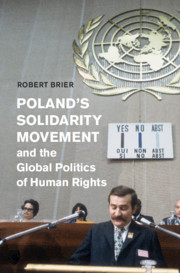Book contents
- Poland’s Solidarity Movement and the Global Politics of Human Rights
- Human Rights in History
- Poland’s Solidarity Movement and the Global Politics of Human Rights
- Copyright page
- Dedication
- Contents
- Acknowledgments
- Note on Geographical Regions
- Note on Cited Primary Documents
- Abbreviations
- Introduction
- 1 The Rise of Dissent in Poland
- 2 Dissent and the Politics of Human Rights
- 3 The Principle of Noninterference as Laid Down in the Helsinki Final Act
- 4 The End of the Ideological Age
- 5 Solidarity, Human Rights, and Anti-Totalitarianism in France
- 6 The “Bedrock of Human Rights”
- 7 Letters from Prison
- 8 Lech Wałęsa, the Symbolism of the Nobel Peace Prize, and Global Human Rights Culture
- 9 General Pinochecki
- 10 Human Rights and the End of the Cold War
- Epilogue
- Bibliography
- Index
3 - The Principle of Noninterference as Laid Down in the Helsinki Final Act
The Polish Crisis, the Cold War, and Human Rights
Published online by Cambridge University Press: 28 May 2021
- Poland’s Solidarity Movement and the Global Politics of Human Rights
- Human Rights in History
- Poland’s Solidarity Movement and the Global Politics of Human Rights
- Copyright page
- Dedication
- Contents
- Acknowledgments
- Note on Geographical Regions
- Note on Cited Primary Documents
- Abbreviations
- Introduction
- 1 The Rise of Dissent in Poland
- 2 Dissent and the Politics of Human Rights
- 3 The Principle of Noninterference as Laid Down in the Helsinki Final Act
- 4 The End of the Ideological Age
- 5 Solidarity, Human Rights, and Anti-Totalitarianism in France
- 6 The “Bedrock of Human Rights”
- 7 Letters from Prison
- 8 Lech Wałęsa, the Symbolism of the Nobel Peace Prize, and Global Human Rights Culture
- 9 General Pinochecki
- 10 Human Rights and the End of the Cold War
- Epilogue
- Bibliography
- Index
Summary
This chapter discusses the impact of the imposition of martial law in Poland in December 1981 on a follow-up meeting of the Conference on Security and Cooperation (CSCE) in Madrid. Thus, the chapter complicates the widely held view of the Final Act of the CSCE as a milestone for the human rights revolution of the 1970s, arguing instead that six years after the Final Act had been signed the position of human rights in international politics remained strongly contested and highly precarious. To make this point, this chapter focuses particularly on the response of the US, the UK, West Germany, France, and Italy to events in Poland.Thus, this chapter demonstrates that, when confronted with massive human rights violations in Poland, the US government did not invoke the CSCE's human rights provisions so much as try to use the situation in Poland as a pretext to end the entire CSCE process. West European governments, on the other hand, insisted on the CSCE Final Act's noninterference clause. It was only a rag-tag alliance of activists from Western civil societies – trade unionists, Cold War hardliners, French Left-wing intellectuals, even peace activists – which pushed their governments to pressure Warsaw to respect human rights.
Keywords
- Type
- Chapter
- Information
- Publisher: Cambridge University PressPrint publication year: 2021

